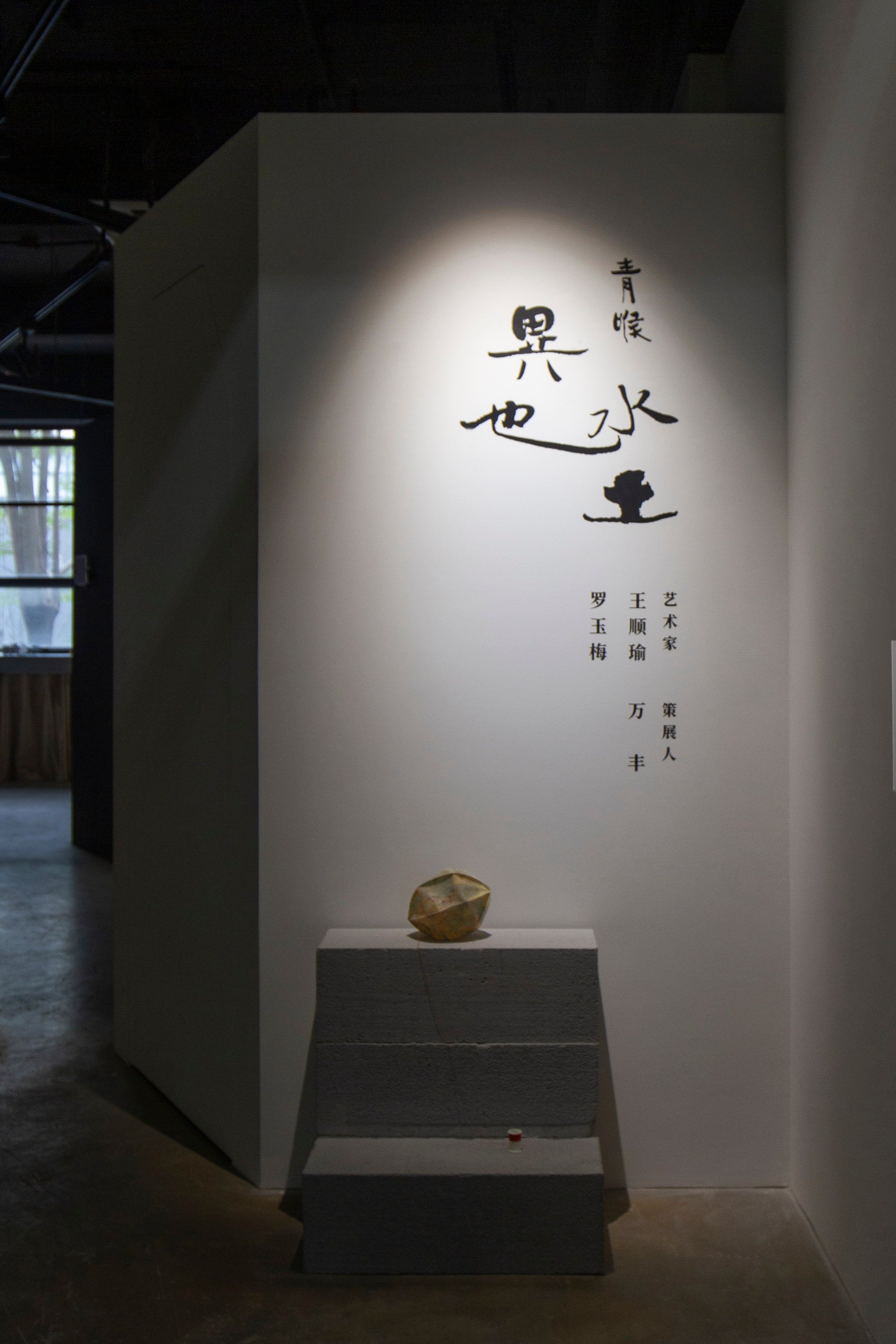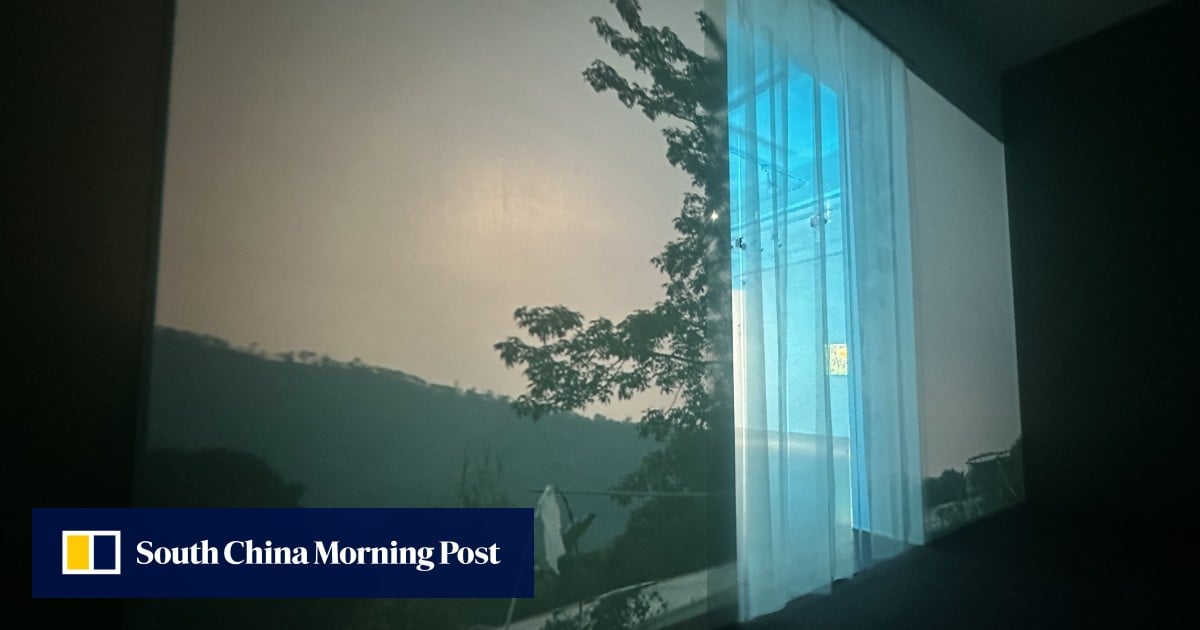The code Law uses in the piece’s title refers to catalogue numbers of a captivating collection of photographs housed at the National Archives in the UK that document the British exploration of their newly acquired territory.

The sepia images focus on the hills in Shenzhen, the river that separates the two cities, and the green valley that forms the northernmost part of Hong Kong. This deliberate division hints at the different, yet connected, destinies of the two places, a theme that runs through the exhibition.
Guangzhou’s art hub ambitions in doubt with sales slow at Moordn Art Fair
Guangzhou’s art hub ambitions in doubt with sales slow at Moordn Art Fair
Law’s works are being shown together with others by Hong Kong-based Wong Shun-yu, an ink painter who also uses different media to depict the extraordinary within the ordinary.
In the piece Some Memories About the Sea (2021), Wong, who is a graduate of Hong Kong Baptist University and Beijing’s Central Academy of Fine Arts, has captured the displacement of a fishing village – a symbol of Hong Kong’s identity – using photographs and a video.
As the fishing industry declines, villagers abandon their ancestral homes for city jobs, leaving behind generations of memories. Deserted temples and houses are all that remain.
Chris Wan, the curator behind the “Blue Throat” exhibition series, which debuted at Hong Kong’s Art Central in April, says the title comes from the Hindu legend of Samudra Manthana.
The gods were churning the ocean in search of an elixir of immortality but the result was a poison which threatened to annihilate everything. Shiva saved the day by swallowing the poison, but it left him with a blue throat that would continue to burn forever.
“Even if they disagree on everything,” Wan says, “people on both sides of the political divide share similar personal experiences.” He hopes to use art as a bridge to transcend ideological boundaries.
Wan has ambitious plans for “Blue Throat”, with Tokyo as the next stop and Europe and the United States in sight.
“Now when we discuss the situations in Hong Kong, the cultural context it faces is too exclusive, and it has many restrictions. There needs to be some cross-cultural discussion.”
‘Full of adventures’: inside China’s award-winning school campus
‘Full of adventures’: inside China’s award-winning school campus
He believes Hong Kong’s current political climate stifles open discussion, making cross-cultural dialogue essential.
By showing Hong Kong art in the context of the Chinese diaspora, for example, he hopes that people can find common ground through art and come to an understanding beyond immediate conflicts.
A few blocks away, another Hong Kong artist, Natalie Lo Lai-lai, presents “As Shards of Dawn Shot Through the Dark” at Enclave Contemporary.
Her new works, spanning photography, painting, video and installation, can be seen to reflect issues very much on the mind of Hong Kong audiences.
For example, A Messenger – Passerby In Our Battlefields (2022-23) delves into the loss of natural habitat, as well as migration, at a time when Hong Kong has witnessed its largest exodus in years.
But Lo’s voice in the video counters: “No bird truly flies forever. They must touch the earth, seek food, and build nests.”
During a recent artist tour, a visitor from Guangzhou said she had a strong emotional connection to Lo’s work. The video’s message of resilience and staking claim to one’s homeland resonated with the struggles of her own life, she said.
‘A yellow catalyst’: famous Rubber Duck back in mini form for Seoul show
‘A yellow catalyst’: famous Rubber Duck back in mini form for Seoul show
While Lo is best known for her video work, she says she has rediscovered her passion for painting recently as she seeks more spontaneity in her artistic expression.
“Sometimes I will jump between editing video and painting. These paintings are not necessary for showing; it allows me to think outside of the box and be as jumpy as I want.”
These two exhibitions, brimming with rich narratives and thought-provoking art, spark dialogue beyond cultural limitations and divides.
They show the power of art to foster understanding and connection, reminding us that shared humanity transcends geographical boundaries and societal constraints.
“Blue Throat: Acclimated Difference (Part 2)”, Hexagon Gallery, Hexagon Gallery, 206, A4, North district, OCT-LOFT, Nanshan district, Shenzhen. Until January 14, 2024.
“Natalie Lo Lai-lai: As Shards of Dawn Shot Through the Dark”, Enclave Contemporary, 1/F East, B4, North district, OCT-LOFT, Nanshan district, Shenzhen. Until January 6, 2024.

